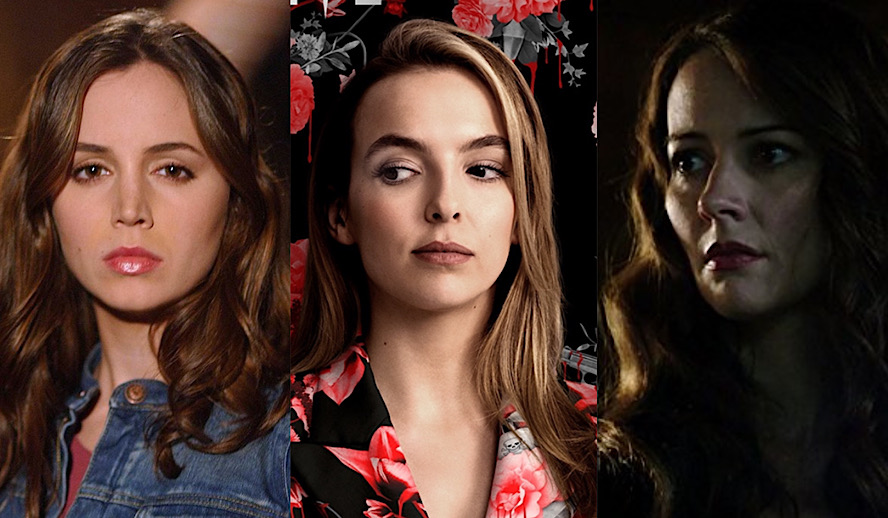Table of Contents

Photo: Female Villain Redemption Arcs
Warning: this article contains spoilers for ‘Killing Eve’ (season 3), ‘Buffy the Vampire Slayer’, ‘Angel’, and ‘Person of Interest’.
The redeemed villain or anti-hero will forever be a riveting character arc. Just think of Bucky Barnes/The Winter Soldier and Loki in the Marvel Cinematic Universe; Prince Zuko in ‘Avatar: The Last Airbender’; Spike in ‘Buffy the Vampire Slayer’ and ‘Angel’; and Kylo Ren in ‘Star Wars’. But women can be evil too; they can also be messy, and gray, and conflicted. Female villains with conflicted morality tend to shine especially well in genre fiction, like Villanelle (Jodie Comer) in BBC America’s spy thriller ‘Killing Eve’.
Related article: 21 Awesome Female Action Movies to Watch
Related article: An Analysis of Why the Entire Series of ‘Killing Eve’ is Fantastic with Review of Season 3
Villanelle is far from a hero at the end of the third season, but she’s made considerable steps away from the outright bloodthirsty persona in which she began the series. As the show’s primary antagonist, Villanelle’s eccentricity, brusqueness, and high fashion quickly captivated viewers’—and Eve’s (Sandra Oh)—hearts. Before Villanelle had an assassin identity crisis in that stately hotel bathroom, other female villains had emerged from the fires of redemption as heroes (or anti-heroes) and come out stronger, more compelling characters. We’ll look at how Villanelle’s character arc compares with those of Faith Lehane (Eliza Dushku) from ‘Buffy the Vampire Slayer’ and ‘Angel’ and Root (Amy Acker) from ‘Person of Interest’.
Villanelle is Moving On and Moving Up
After shooting Eve and leaving her for dead in the second season finale, Villanelle is trying to move on. She begins the third season at her wedding to a wealthy Spanish woman named Maria (Carmen Montero). The ceremony is an ostentatious show of love, but it’s clear from Villanelle’s materialistic remarks about her new wife—“When I first met Maria, I thought, ‘Great shoes.’”—that she only admires her luxurious lifestyle. Villanelle’s former mentor Dasha (Harriet Walter) crashes the wedding and tries to get Villanelle to return to the Twelve, the shadowy assassin organization Villanelle worked for. Villanelle says she’ll only come back if they promote her. So begins Villanelle’s attempts to fill a growing void in her life with power: aiming to move up within the Twelve and surpass Dasha and her former handler Konstantin (Kim Bodina); buying a custom perfume that she says smells like power; taunting Eve by surprising her on a bus and sending her a birthday cake and a stuffed bear with a recording of her own voice.
Subscribe to Hollywood Insider’s YouTube Channel, by clicking here.
But her path toward promotion isn’t giving her the satisfaction she assumed it would, and she’s increasingly distracted in her assassin duties. With Konstantin’s help, Villanelle locates her remaining family, who she had thought died in a car crash, and returns to Russia. Villanelle discovers on the visit that her mother Tatiana (Evgenia Dodina) is abusive to her younger half-brother, and realizes she’s always been this way. When Tatiana rejects Villanelle, accuses her of bringing darkness to the house, and tells her to leave, Villanelle flips it on her mother, saying she is the darkness and always has been. In a quiet rage, Villanelle kills most of the family, sparing only her brother and half-brother.
Turning Point
After murdering her mother, Villanelle starts to lose what little focus she had. When Dasha finds her wounded on the floor in the hotel bathroom after a botched job, Villanelle tearfully admits, “I don’t want to do this anymore.” Killing has become more unsettling to Villanelle, and it’s unclear if it’s the act of killing that is twisting her conscience or if she simply no longer wants to be used as a tool by the Twelve and the mentors in her life. She turns to Eve, who is the only person who sees her as so much more than just a killer.
Related article: The Power of Positivity: Ikorodu Bois + Chris Hemsworth + Russo Brothers + Sam Hargrave
Limited Time Offer – FREE Subscription to Hollywood Insider
The final scene of season three between Villanelle and Eve is the polar opposite of where Villanelle began the season, let alone the series. It depicts Eve and Villanelle looking out on the Thames from Tower Bridge. They’re on the architectural symbol of a crossroads, and they even stay on opposite sides of a line sectioning the bridge. Eve says she wants to stop the monster inside herself, which Villanelle concludes is encouraged by her own monster. Villanelle decides that the best thing for Eve would be for them to walk away from each other and never look back. They stand back to back, and Villanelle starts walking away. Eve does too after a beat, then turns around. Villanelle has stopped walking and turns too. They stare at each other, on opposite sides of the bridge, with a wide distance between them.
By suggesting they walk away from each other for good, Villanelle is quietly and even nobly trying to do what is best for Eve, and for herself. It’s in contrast to the previous season’s finale when Villanelle proclaimed her love for Eve, and Eve replied, “You don’t understand what that is,” before Villanelle shot her and left her for dead. However, they both turn around before walking away, and it feels like they’re not going to take their own advice, but the desire for change is pushing Villanelle toward a path that might be what redemption looks like in the complicated world of ‘Killing Eve’.
Related article: Hollywood Insider’s CEO Pritan Ambroase: “The Importance of Venice Film Festival as the Protector of Cinema”
Related article: The Masters of Cinema Archives: Hollywood Insider Pays Tribute to ‘La Vie En Rose’, Exclusive Interview with Director Olivier Dahan
“Leather pants, nice right cross, doe eyes, holier-than-thou glower? You must be Faith.”
When new Slayer Faith first blazed onto the screen in the third season of ‘Buffy the Vampire Slayer’, it was clear she was constructed as a foil for Buffy (Sarah Michelle Gellar): the darker hair and clothes, the unrestrained passion for slaying and partying, and her more outspoken and casual perspective on sex. Buffy and Faith’s opposing views on slaying are made clear when Buffy rebuffs Faith’s assertions that slaying is fun. Faith replies, “Slaying is what we’re built for. If you’re not enjoying it, you’re doing something wrong.”
From what is revealed about her background, Faith had a bad home life. Then her Watcher was killed by a particularly strong vampire and she was left with trauma and trust issues. When Faith arrives in Sunnydale, she’s a presumed minor living in a dingy motel without adult supervision. Though she comes off as cool and carefree, she’s masking her vulnerabilities, and ultimately lacks the tools and trust in others to ask for help when she makes a deadly mistake midway through the season: Faith kills Deputy Mayor Allan Finch (Jack Plotnick), thinking him a vampire, and begins down the path of evil.
Related article: Carey Mulligan’s ‘Promising Young Woman’ Makes a Promise to All Women in Their Quest for Justice
Related article: A Tribute to Ruth Bader Ginsburg: 32 Facts on Justice of the Supreme Court and Women’s Rights Icon
“Pretty, dark hair, kills things.”
Buffy confronts Faith about the killing, wanting to tell her Watcher Giles (Anthony Head), but Faith refuses. Buffy says, “Faith, you don’t get it. You killed a man.” Faith replies, “No, you don’t get it. I don’t care.” Though Faith is rattled by what she’s done, the only way she knows to protect herself from the emotional trauma is to pretend not to care. Faith’s inability to take responsibility for the act, even trying to pass the blame to Buffy at one point, further drives a wedge between her and Buffy’s Scooby Gang. The worse things get, the clearer it becomes that Faith is a picture of what Buffy could have been like if she’d had no support system. This version of Buffy is even shown in an alternate universe where Buffy never came to Sunnydale, and she’s harder, physically scarred, and even dies at the end of the episode.
Feeling like she has no one left to turn to, Faith seeks out the Mayor (Harry Groener), the season’s main antagonist, to become his new assistant. In the Mayor, she finds a father figure, someone who supports her unconditionally. The goodness in their relationship fills a void in Faith’s life but also drives her further into darkness as she continues to seek the Mayor’s approval by helping carry out his nefarious plans. Faith’s arc in the third season culminates in a brutal fight with Buffy that leaves Faith in a coma.
Related article: Greta Gerwig: A Creative Force of Nature, Paving a Path for Women in Cinema
Related article: Top 5 Female Empowerment Shows on Netflix to Watch With Your Girlfriends
The Rogue Slayer
Faith returns for two episodes in season four when she awakens from her coma and is out for revenge. She holds Buffy’s mom Joyce (Kristine Sutherland) hostage while waiting for Buffy and says, “You think you matter. You think you’re a part of something, and you get dumped. It’s like the whole world is moving, but you’re stuck. Like those animals in the tar pits. It’s like you keep sinking a little deeper every day, and nobody even sees.” Faith’s statement reveals just how alone she feels, and how rejection by nearly everyone in her life led her down the path of villainy.
Using a gift left to her by the deceased Mayor, she switches bodies with Buffy and intends to flee the country. When in Buffy’s body, she mockingly repeats, “You can’t do that. It’s wrong,” in the mirror. But when she literally takes a walk in Buffy’s shoes, she sees how loved and appreciated Buffy is as a person and as the noble Slayer. Instead of running away, Faith is compelled to return and save a group of parishioners held hostage by vampires. When she tells them they’re not going to kill these people, a vampire asks her why not. She replies by repeating the line she previously mocked: “Because it’s wrong.” Faith says this as Buffy would, in a truthful, empowering, heroic way. Buffy arrives in Faith’s body, and they fight once more. As Faith punches her own body in the face, she verbally berates herself, making it painfully clear she despises herself for what she’s done.
Related article: 8 Glass-Ceiling Breaking Female Pioneers in Cinema from Old Hollywood to Now
Related article: Did Reese Witherspoon-Led Company Pacific Standard Succeed in Creating Meaningful Female-Led Content?
Female Villain Redemption Arcs – Leap of Faith
Faith has finally realized just how bad she’s become, but she still believes it’s too late for her; so yet again, instead of asking for help or taking responsibility, she travels to Los Angeles in the ‘Buffy’ spin-off series ‘Angel’. There she takes a job from the villainous law firm Wolfram & Hart to assassinate Angel (David Boreanaz)—or so it appears. In an attempt to bait Angel into killing her, Faith kidnaps and brutally tortures Angel’s friend and Faith’s former Watcher Wesley (Alexis Denisof). Continuing her refusal to take responsibility for her actions, Faith asks Wesley if he thinks things might have been different had he been Buffy’s Watcher and Giles been hers. Angel arrives, and their knock-down, drag-out fight ends in an alley during a rainstorm. In the cleansing downpour, Faith screams at Angel that she’s bad, she’s evil, just kill her already. Instead, he holds her tightly as she cries, and the fight goes out of her. Angel vows to help her, despite the objections of, well, everyone. Angel tells her that he’ll support her in her path to redemption.
Buffy arrives to find Angel comforting Faith and is furious with Angel for helping her. Faith tries to apologize, but Buffy doesn’t want to hear it. Ultimately, Faith turns herself in to the police. Handcuffed, sitting in a chair in the police station, Faith looks back over her shoulder to Angel and Buffy. At that moment, she’s never looked so young; yet this is the next step in her redemption and it’s the first consequential moment of her taking responsibility for what she’s done.
Related article: ‘Ava’ Review – The Newest Assassin Film with a Female Protagonist Starring Jessica Chastain, Common
Related article: Disney Princess Movies Have Evolved To Magically Unchain Young Women from Societal Pressures
“The road to redemption is a rocky path. Think we might make it?”
Faith spends several years in prison but then breaks out when Wesley asks for her help defeating Angelus (soulless Angel) after Angel loses his soul again. The ease with which she escapes shows she was there because she wanted to be. Once out of prison, she begins the second phase of her redemption through fighting evil, actively making up for her past. Since Angel was the only person who never gave up on her, Faith refuses to kill Angelus. Instead, she wants to restore his soul. Wesley tries to goad her into returning to her darker, more violent self, so she can defeat Angelus, but Faith wants to look for a better way because she’s not that person anymore.
Instead, Faith risks her life by shooting herself up with a dangerous mystical opioid called Orpheus and tricks Angelus into feeding off of her, sending both of them into comatose states. They mentally share a dream space following Angel’s own path to redemption, which helped him relate to Faith. While in the dream state, Angel tells Faith to keep fighting and that they’re never done paying their dues. Faith finds the strength to fight on. She then returns to Sunnydale to battle the First Evil alongside Buffy, her friends, and the potential slayers. Though their outlooks often still differ, Buffy and Faith eventually reconcile. After serving (some of) her time, Faith now keeps fighting evil in an active way.
Related article: Are Misogynistic Tendencies and Lack of Female Representation in Film Changing in 2020?
Related article: Review: Elle Fanning’s ‘The Great’ Inspired by Female Leader on Hulu is The No. 1 Show
Bad Code
‘Person of Interest’ is a show about a paranoid computer programmer who “built god,” a reformed dirty cop and a noble one, and some former assassins trying to protect people from harm in New York City. But it’s also about a ragtag group of people searching for a second chance in the world and their quest to prevent a malevolent artificial superintelligence from coming to power. Root’s first full appearance in ‘Person of Interest’ was a ruse: a psychiatrist who appeared in need of protection but was really just trying to get closer to Harold Finch (Michael Emerson). Her goal was to find the Machine, an artificial superintelligence Harold built to predict acts of terror. Root began the series as a hacker and killer-for-hire with a complete lack of morals, but through her interactions with the Machine and her newfound allies, she finds her humanity again.
As a child, Root saw her best friend get kidnapped, and the trusted adult she told refused to listen to her. Her friend wound up murdered, and Root’s world view came into focus: people are inherently flawed and untrustworthy. “One day I realized,” she tells Harold, “all the dumb, selfish things people do, it’s not our fault. No one designed us. We’re just an accident, Harold. We’re just bad code.” Root’s world view is completely transhumanist, believing that humans can’t be saved and that the cold rationale of an artificial superintelligence is the next stage in evolution.
Related article: Margot Robbie’s Pirates of the Caribbean with All-Female Pirates
Related article: Review: ‘Mrs America’ – An All-Female Writer-Director-Cast Team
Harold is rescued from Root by John Reese (Jim Caviezel), and Root gets away. She shows up again later, still searching for the Machine. When she doesn’t find it, she breaks down. Her search for a higher power ended in failure. In a near-catatonic state, Finch admits her to a psych ward. She eventually escapes with the help of the Machine, who has chosen Root to be the Machine’s Analogue Interface. Root finds purpose working for the Machine, which she describes as “my power, my reason for existing, my friend.” Part of Root’s work for the Machine involves trying to stop a second and more malevolent ASI, Samaritan, from coming online. Her goals and the goals of the other major characters overlap, and her interactions with them help give her a new perspective on humanity.
“I know it seems weird, but I’m one of the good guys now, Harold.”
A turning point for Root is when on a mission for the Machine, she must weigh saving the life of former banker and current janitor Cyrus (Yul Vazquez) against thwarting the plans of Samaritan agents. Root scoffs at Cyrus’s belief that everything happens for a reason. “That’s the problem with humans,” Root says to Harold. “They just sit around, hoping that someone will fix things. But no one will. No one cares. The universe is infinite and chaotic and cold.”
Ironically, Root is the reason for Cyrus’s beliefs: years before, someone had been sent to kill him and his coworkers, but he’d lived, and the assassin had been Root. Despite her apparent cold-heartedness, Root ultimately chooses to save Cyrus. Like the rest of the team, Root has come to believe that people are in fact worth saving.
Related article: The Verified Complete List of Every Female Best Director Oscar Winner: Fact-Checked Series
Related article: The Verified Complete List of Every Female Best Director Golden Globes Winner: Fact-Checked Series
“I can’t live without you.”
Early on, Root had mocked Harold for how much he cares about people and thought it his weakness. As her relationship with Sameen Shaw (Sarah Shahi), a self-diagnosed sociopath and former government assassin, develops and deepens, she ultimately finds she has the same weakness. Throughout the series, Root flirts with Shaw relentlessly to little reaction, but they work well together on missions and Shaw always trusts Root. In a tense shootout with Samaritan agents, Root tells Shaw that they’re good together and that Shaw will figure that out someday. In order for the team to escape, Shaw sacrifices herself, kissing Root before running into a hail of bullets.
Root spends months searching for Shaw, never giving up hope she’s alive until the Machine tells Root to stop and focus on defeating Samaritan. In the long stretch of episodes where Shaw is absent, Root’s loneliness is apparent through the cinematography, framing shots with Root and large, empty spaces beside her—spaces where Shaw should be. When Shaw finally escapes, she runs into Root and threatens to shoot herself, fearing that the psychological torture Samaritan inflicted on her may unknowingly cause her to harm Root or the team. Root holds a gun on herself and says, “You can’t live with me? I can’t live without you.” Shaw eventually lowers her gun and they rejoin the team together. Before one of the final fights, Shaw mentions that it would be nice if they could go back. But Root replies, “Actually, Sameen, I’ve been hiding since I was twelve. This might be the first time I feel like I belong,” and takes Shaw’s hand.
Related article: Can ‘Frozen 2’ Live Up To The First Installment’s Highly Successful Tale Of Powerful Female Leaders And Sisterly Love?
Related article: ‘Shrill’: The Second Season of the Hulu Original Continues to Celebrate, Champion and Empower Women of Larger Sizes and De-Stigmatizes the Word ‘Fat’
Root’s feelings for Shaw helped her find a love for humanity. She came to recognize the value of human life so much that she threatened her own life and autonomy multiple times when trying to get Shaw back from Samaritan. In the end, Root died to save Harold, her friend, and to help the team stop Samaritan from taking over the world. While she began the series as a cold-hearted killer and antagonist to the main characters, she ultimately found purpose, friendship, and love that redeemed her.
Beautiful Monster
Through harrowing, long journeys, both Faith and Root were able to change. How might Villanelle do the same? Everyone in her life (except Eve) thinks she’s a killer and nothing more. Villanelle’s new boss Hélène (Camille Cottin) calls her “an agent of chaos” and “a beautiful monster.” Dasha tells Eve that Villanelle is “a perfect killing machine. That’s all she’s there for. That’s all she knows.” Villanelle meets with Carolyn (Fiona Shaw) to try to work for MI6, but Carolyn says she has nothing to offer: “You were trained to do one thing and one thing only. If you can’t do that, what use are you to me? Or to anyone?” Villanelle replies, “I can change,” and Carolyn shrewdly asks, “If Villanelle has retired, what’s left? Oksana? I can’t see that working for MI6, can you?”
In the final episode of season three, Eve meets Villanelle at a dance hall. Villanelle ruminates on what her life might have been like if things had been different, like Faith does with Wesley, as it was before Faith had decided to walk the road of redemption. The comment is also opposed to Root’s statement to Shaw: Root was at the end of her redemption journey and wouldn’t change how things turned out.
Related article: ‘Star Wars’: From 1977 to 2020 — In 43 Years of Star Wars Films, How Has the Role of Women Changed? Carrie Fisher, Natalie Portman, Daisy Ridley, Etc.
Villanelle and Eve sway cheek-to-cheek together on the dance floor, with their faces parallel but facing opposite directions. Villanelle admits, “I’ve killed so many people, Eve,” and it sounds like an apology. Eve replies, full of understanding, “I know.” It’s likely that season four will include a team-up between Eve and Villanelle as they try to take down the Twelve, but whether or not Villanelle will give up killing remains to be seen.
Conclusion
Villanelle may not be as far along on her (possible) redemption arc as Faith and Root, but she’s on a path toward change. She knows she wants to change, but she’s not sure how. The only thing she knows she still wants is Eve. Unlike Faith’s journey, Villanelle’s most likely won’t be filled with guilt and compulsion to do good deeds to make up for the past. She may be headed on a trajectory more like Root’s—finding a new calling trying to take down a bigger bad than herself and finding solace in a person who believes in her and loves her despite the darkness inside her.
Faith’s redemption covers a fully arc-shaped journey, beginning as a roguish hero, descending into darkness, and clawing her way back to the light. Once she realized the extent of the terrible things she’d done, her continued existence depended on her fight for redemption. That fight was made possible through Angel’s unwavering belief in her and through her own strength. Root’s path is more of an incline, beginning with a total lack of faith in humanity and eventually finding humanity in herself and others. While Root’s journey involved less inner turmoil than Faith’s, it still charted a complete reversal in her world view, which changed realistically through the missions she completed for the Machine and through the relationships she developed with her friends and love interest, Shaw.
Related article: ‘And Just Like That’ ‘Sex and the City’ Returns in an HBO Max Limited Series With a Trio
Whatever shape Villanelle’s character arc takes, it’s already a fascinating one, and will surely involve killer fashion. In the cases of Faith, Root, and Villanelle, it’s powerful to see women fight their own demons or find something so worthwhile that it supersedes their belief that evil (or even apathy) is a better or easier course in life. Whether they struggle with redemption and change for the sake of love or their own souls or are just beginning to turn away from evil, here’s to many more complex female villains charming their way into our hearts.
Stream all available seasons of ‘Killing Eve’, ‘Buffy the Vampire Slayer’, and ‘Angel’ on Hulu now. ‘Person of Interest’ is coming to HBO Max January 23.
Click here to read Hollywood Insider’s CEO Pritan Ambroase’s love letter to Black Lives Matter, in which he tackles more than just police reform, press freedom and more – click here.
An excerpt from the love letter: Hollywood Insider’s CEO/editor-in-chief Pritan Ambroase affirms, “Hollywood Insider fully supports the much-needed Black Lives Matter movement. We are actively, physically and digitally a part of this global movement. We will continue reporting on this major issue of police brutality and legal murders of Black people to hold the system accountable. We will continue reporting on this major issue with kindness and respect to all Black people, as each and every one of them are seen and heard. Just a reminder, that the Black Lives Matter movement is about more than just police brutality and extends into banking, housing, education, medical, infrastructure, etc. We have the space and time for all your stories. We believe in peaceful/non-violent protests and I would like to request the rest of media to focus on 95% of the protests that are peaceful and working effectively with positive changes happening daily. Media has a responsibility to better the world and Hollywood Insider will continue to do so.”
More Interesting Stories From Hollywood Insider
– Want GUARANTEED SUCCESS? Remove these ten words from your vocabulary| Transform your life INSTANTLY
– Compilation: All James Bond 007 Opening Sequences From 1962 Sean Connery to Daniel Craig
– Do you know the hidden messages in ‘Call Me By Your Name’? Find out behind the scenes facts in the full commentary and In-depth analysis of the cinematic masterpiece
– A Tribute To The Academy Awards: All Best Actor/Actress Speeches From The Beginning Of Oscars 1929-2019 | From Rami Malek, Leonardo DiCaprio To Denzel Washington, Halle Berry & Beyond | From Olivia Colman, Meryl Streep To Bette Davis & Beyond
– In the 32nd Year Of His Career, Keanu Reeves’ Face Continues To Reign After Launching Movies Earning Over $4.3 Billion In Total – “John Wick”, “Toy Story 4”, “Matrix”, And Many More
female villain, female villain, female villain, female villain, female villain, female villain, female villain, female villain, female villain, female villain, female villain, female villain, female villain, female villain, female villain, female villain, female villain, female villain, female villain, female villain, female villain, female villain, female villain, female villain, female villain, female villain, female villain, female villain, female villain, female villain, female villain, female villain, female villain, female villain, female villain, female villain, female villain, female villain, female villain, female villain, female villain, female villain

Claire L. Wong is a writer from the San Francisco Bay Area who strives to advance intelligent analysis, diversity, and compassionate storytelling in her work. She especially likes writing about science fiction, action, AAPI, and LGBTQ+ stories. She believes that visual storytelling through film and television increases the practice of empathy, which aligns with Hollywood Insider’s goal to use meaningful entertainment as a unifying tool. (she/her)








